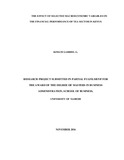The Effect of Selected Macroeconomic Variables on the Financial Performance of Tea Sector in Kenya
| dc.contributor.author | Kimani, Gabriel G. | |
| dc.date.accessioned | 2017-01-03T06:32:33Z | |
| dc.date.available | 2017-01-03T06:32:33Z | |
| dc.date.issued | 2016-11 | |
| dc.identifier.uri | http://hdl.handle.net/11295/98530 | |
| dc.description.abstract | Tea sector revenues to growers are affected by unprecedented fluctuations of average tea prices in the market. Determination of these prices by a set of selected macroeconomic variables the subject of this investigation taking into account the sector performance being dependent variable while on the other hand independent variables as the economic factors. The selected macroeconomic variables were: Inflation Rate, exchange Rate, % GDP growth and bank Interest Rate. This research sought to investigate influence of the economic factors on average tea prices. A time series of secondary data from KNBS spanning from Years 2007 to June 2016,taken at quarterly intervals per year was used employing 38 data points enough to provide inference upon analysis. A functional mathematical model was deployed to analyze through regression the influence that selected macroeconomic variables have on the average prices of tea. The study established varying degrees of effect on tea sector performance (prices) by the independent variables selected. A unit increase in Exchange Rate of Kenya Shilling (Ksh) against USD ($) increases the average tea price by 0.017 (approximately 2%). GDP growth rate increase by a unit leads to decrease in tea prices by 0.098 (approximately minus10%). Bank lending interest rate unit rise increases the average tea price by 0.043 (approximately 4%). Tea price decreases by 0.057 (approximately 6%) with unit increase in inflation rate. These macroeconomic variables should therefore be carefully considered by policy makers and stakeholders in the tea sector while designing related macroeconomic policies. Practitioners and finance managers should take caution on effect of changes in macroeconomic environment when forecasting tea earnings and devising pricing strategies. Unprecedented fluctuations in the selected macroeconomic factors would translate into unstable earnings. Further research should be initiated to demonstrate how the selected relate with prices of other export crops in addition to other different economic sub-sectors. | en_US |
| dc.language.iso | en | en_US |
| dc.publisher | University of Nairobi | en_US |
| dc.rights | Attribution-NonCommercial-NoDerivs 3.0 United States | * |
| dc.rights.uri | http://creativecommons.org/licenses/by-nc-nd/3.0/us/ | * |
| dc.title | The Effect of Selected Macroeconomic Variables on the Financial Performance of Tea Sector in Kenya | en_US |
| dc.type | Thesis | en_US |



